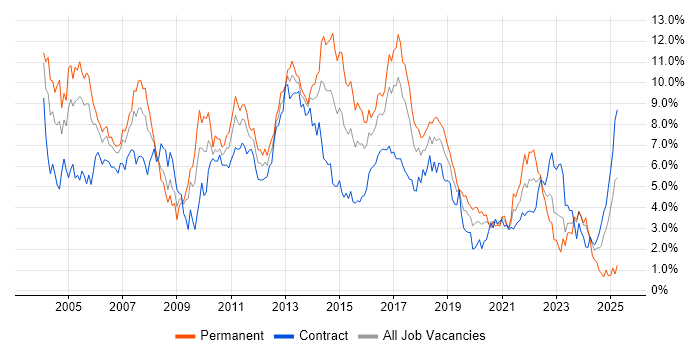Relational Database
Scotland > Glasgow
The table below provides summary statistics for permanent job vacancies advertised in Glasgow requiring Relational Database skills. It includes a benchmarking guide to the annual salaries offered in vacancies that cited Relational Database over the 6 months leading up to 18 May 2025, comparing them to the same period in the previous two years.
| 6 months to 18 May 2025 |
Same period 2024 | Same period 2023 | |
|---|---|---|---|
| Rank | 50 | 116 | 91 |
| Rank change year-on-year | +66 | -25 | -57 |
| Permanent jobs citing Relational Database | 6 | 156 | 39 |
| As % of all permanent jobs advertised in Glasgow | 1.21% | 3.91% | 2.53% |
| As % of the Database & Business Intelligence category | 7.59% | 10.46% | 13.88% |
| Number of salaries quoted | 3 | 16 | 19 |
| 10th Percentile | £70,000 | £35,000 | - |
| 25th Percentile | £73,750 | £44,500 | £36,250 |
| Median annual salary (50th Percentile) | £90,000 | £50,000 | £39,500 |
| Median % change year-on-year | +80.00% | +26.58% | +5.33% |
| 75th Percentile | £100,000 | £57,500 | £53,029 |
| 90th Percentile | - | £62,500 | £55,500 |
| Scotland median annual salary | £77,500 | £50,000 | £50,238 |
| % change year-on-year | +55.00% | -0.47% | +11.64% |
All Database and Business Intelligence Skills
Glasgow
Relational Database falls under the Databases and Business Intelligence category. For comparison with the information above, the following table provides summary statistics for all permanent job vacancies requiring database or business intelligence skills in Glasgow.
| Permanent vacancies with a requirement for database or business intelligence skills | 79 | 1,492 | 281 |
| As % of all permanent jobs advertised in Glasgow | 15.93% | 37.37% | 18.22% |
| Number of salaries quoted | 39 | 183 | 162 |
| 10th Percentile | £35,550 | £32,500 | £36,609 |
| 25th Percentile | £40,000 | £42,500 | £44,762 |
| Median annual salary (50th Percentile) | £55,000 | £52,500 | £59,500 |
| Median % change year-on-year | +4.76% | -11.76% | +24.22% |
| 75th Percentile | £64,375 | £61,250 | £70,000 |
| 90th Percentile | £100,000 | £74,350 | £75,000 |
| Scotland median annual salary | £55,000 | £52,500 | £60,000 |
| % change year-on-year | +4.76% | -12.50% | +9.09% |
Relational Database
Job Vacancy Trend in Glasgow
Job postings citing Relational Database as a proportion of all IT jobs advertised in Glasgow.

Relational Database
Salary Trend in Glasgow
3-month moving average salary quoted in jobs citing Relational Database in Glasgow.
Relational Database
Salary Histogram in Glasgow
Salary distribution for jobs citing Relational Database in Glasgow over the 6 months to 18 May 2025.
Relational Database
Co-occurring Skills and Capabilities in Glasgow by Category
The follow tables expand on the table above by listing co-occurrences grouped by category. The same employment type, locality and period is covered with up to 20 co-occurrences shown in each of the following categories:
